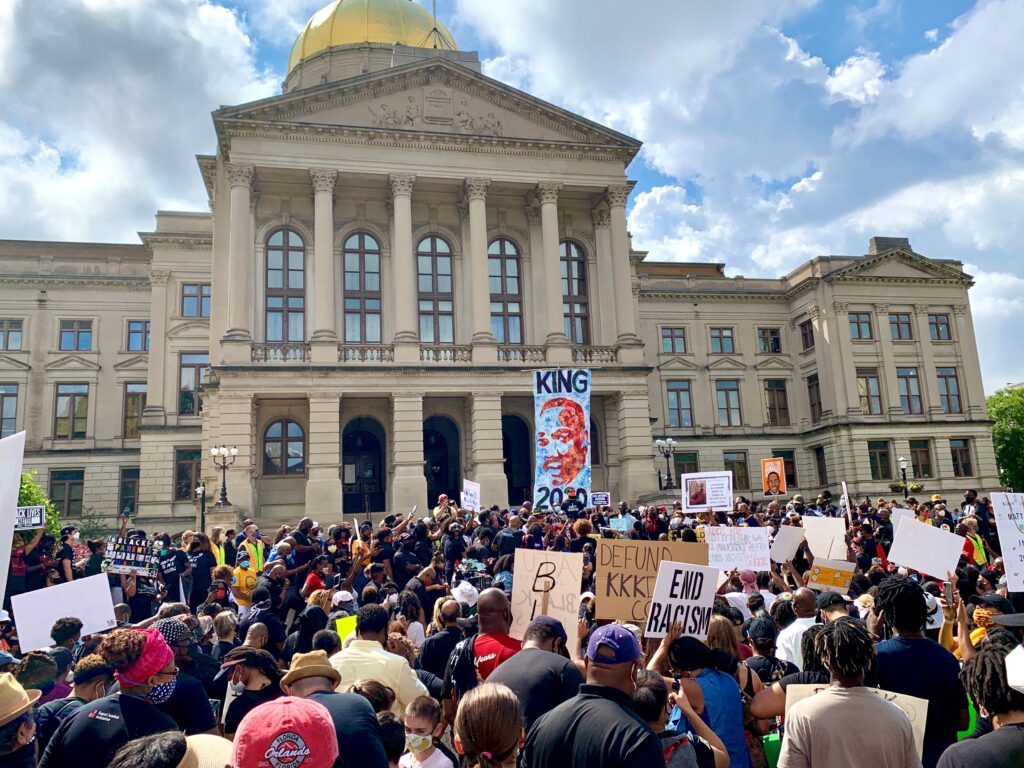
ATLANTA – The double-barreled ugliness that was 2020 in America is reverberating in 2021 in a crime wave that has hit cities across the country, including Atlanta.
In Georgia, the rise in violent crime sparked by the coronavirus pandemic and the nationwide protests following the murder of George Floyd, a Black man, at the hands of a white police officer in Minneapolis is being felt primarily in the metro region.
But the increase in crime is raising alarms at the Georgia Capitol to the point that a committee in the state House of Representatives has begun holding hearings to try to identify the causes of what’s happening and how the state might help fix it.
“Atlanta has been the engine that runs Georgia,” Rep. Darlene Taylor, R-Thomasville, said late last month during the House Public Safety and Homeland Security Committee’s initial hearing. “We cannot let this deteriorate.”
“We have a crime wave in Atlanta, a battle that we’re losing,” added House Speaker David Ralston, R-Blue Ridge, who tasked the committee to look into the issue. “The only way we’re going to win it is to work together.”
The statistics are grim. Homicides in metro Atlanta are up by 60% so far this year over 2020.
Statewide, there were 125,873 “crimes against persons” – including death investigations, assaults and robberies – during the first 10 months of the current fiscal year, according to the Georgia Bureau of Investigation (GBI). That’s slightly higher than the 125,680 such crimes reported during all of fiscal 2020.
The increase in the broad category of assaults, robberies, kidnapping and human trafficking was particularly dramatic, 19,746 through the first 10 months of fiscal 2021 compared to 15,809 for all of the last fiscal year.
Dean Dabney, chairman of the Department of Criminal Justice and Criminology at Georgia State University, said COVID-19 is partly to blame for the crime wave.
While domestic violence didn’t rise significantly during the pandemic, according to national research, street crimes did, Dabney said.
“It was people on the streets, gangs, drugs, those kinds of dynamics,” he said.
Dabney said that trend was particularly pronounced in Georgia. As one of the first states to reopen its economy, Georgia drew people from other states anxious to escape mandatory lockdowns, he said.
He suggested the shutdown of courts during the pandemic also has contributed to higher crime by delaying prosecutions, which left accused criminals on the streets.
But Dabney said the fallout from the deaths last year of Floyd and Rayshard Brooks in Atlanta has played a larger role in the crime wave than COVID-19 because of the impact the protests have had on police officers.
“There’s been a slight drop in community willingness to engage with police,” he said. “But more of it is due to police not feeling comfortable with the rules of engagement.”
Several members of the House committee said much the same thing during the panel’s first hearing.
“There’s been a tidal wave that’s touched down on law enforcement,” said committee Chairman J Collins, R-Villa Rica. “Law enforcement [officers] are scared to do their jobs.”
While the General Assembly is in the business of passing laws, Ralston said new legislation is not going to fix the problem.
“I’m not sure we need new laws,” he said. “We need a new commitment to enforce the laws we have. … We’re not apprehending people for committing crimes, and those we do we’re not bringing to justice.”
Instead of legislation, the state is dedicating money and personnel to fighting the crime wave. Gov. Brian Kemp has committed up to $5 million of the Governor’s Emergency Fund to support state efforts to bring crime in Atlanta under control.
“The state has some assets that can be of help, the state patrol, GBI, the Department of Natural Resources and others,” Ralston said. “I want to see a unified effort to deal with a serious problem.”
But the brunt of combating Atlanta’s crime wave falls on the city. Rodney Bryant, Atlanta’s new police chief, announced a plan June 7 to restructure the Atlanta Police Department (APD) by creating a new domestic violence team, centralizing its investigative unit and expanding its gun assault unit.
“The state can only do so much,” Kemp said. “I’m glad the APD is stepping up. We’ve needed that kind of leadership in the city.”
Dabney said the police presence needs to increase if Atlanta and other cities are to come to grips with the crime wave.
“Crime rates dropped precipitously over the last decade due in part to a proactive policy … as opposed to waiting for 911 calls and going there in a reactive manner,” he said. “That came to a screeching halt last summer.”
But in the current atmosphere, Dabney said police have to be careful in how they step up their presence.
“You can’t just go back to the old way of aggressive policing. The community does not like that,” he said. “You need to revisit the tenets of community policing. … You have to do reform and you have to do proactive.”
Democrats on the House committee say they hope Republicans won’t use the hearing to win votes by stirring up fears of crime.
“If it’s political theater, I’m not interested,” said Rep. Scott Holcomb, D-Atlanta. “I’m interested in solutions.”
Collins said the committee’s mission is serious.
“There’s going to be politics in this,” he said. “[But] this committee wants to dig down and look at the facts.”